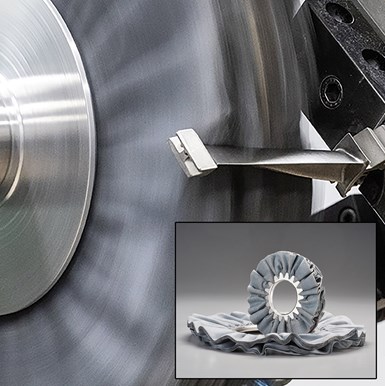Norton buffing wheels use minimal compound to maximize product life
Key applications include automatic or semi-automatic buffing, cut buffing and mush buffing in a range of markets such as automotive, hardware, oil and gas and more.

Norton’s FAB buffing wheels
Saint-Gobain Abrasives’ Norton FAB (fixed abrasive buff) buffing wheels operate with a significantly decreased need for buffing compounds. Their design incorporates abrasive grains into the buffing wheel, resulting in Ra values ranging from 1 to 5 Ra. The wheels are tear-resistant and waterproof, enabling a longer life than traditional cotton buffs, the company says.
The Norton FAB is intended to provide efficient, safe buffing with minimal clean-up. With less compound to purchase, apply and dispose of, costs are minimized and environmental impact is reduced.
A premium silicon carbide abrasive is uniformly applied to both sides of the cloth for a more consistent buffing performance. Norton FAB wheels can be easily incorporated into new or existing robotic buffing applications.
Key applications include automatic or semi-automatic buffing, cut buffing and mush buffing in a range of markets such as automotive, hardware, oil and gas and more. The wheels are effective on hard alloys as well as soft metals such as aluminum and brass. Norton FAB Wheels are available in outer diameters from 5" to 22", in 12 or 16 ply (number of cloth layers of buff), 2 or 4 pack (waviness of the buff face) and various ID hole designs.
Related Content
-
Composites end markets: Electronics (2024)
Increasingly, prototype and production-ready smart devices featuring thermoplastic composite cases and other components provide lightweight, optimized sustainable alternatives to metal.
-
Plant tour: Arris Composites, Berkeley, Calif., U.S.
The creator of Additive Molding is leveraging automation and thermoplastics to provide high-volume, high-quality, sustainable composites manufacturing services.
-
JEC World 2023 highlights: Recyclable resins, renewable energy solutions, award-winning automotive
CW technical editor Hannah Mason recaps some of the technology on display at JEC World, including natural, bio-based or recyclable materials solutions, innovative automotive and renewable energy components and more.











